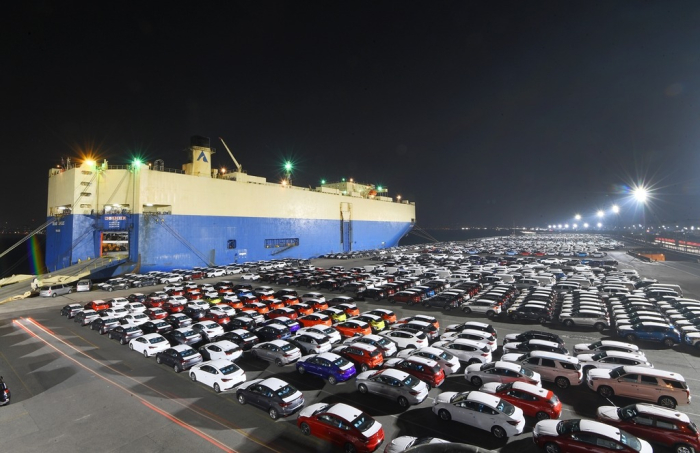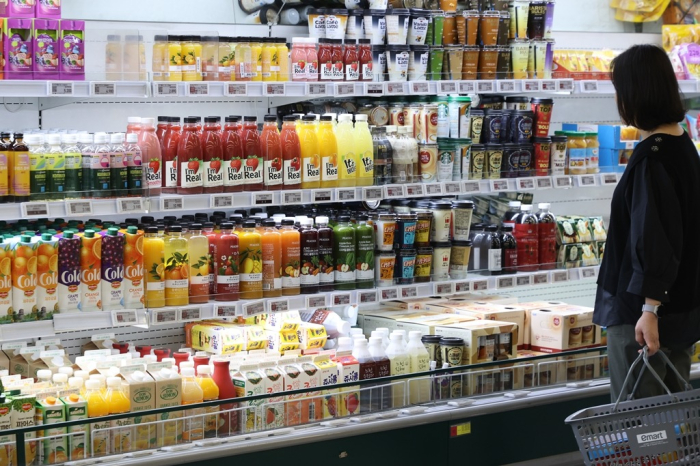Korea’s April factory output rebounds amid weak consumption
Auto production rose at the fastest pace since January 2023; semiconductor output fell for a second straight month
By May 31, 2024 (Gmt+09:00)
Samsung steps up AR race with advanced microdisplay for smart glasses


When in S. Korea, it’s a ritual: Foreigners make stops at CU, GS25, 7-Eleven


Maybe Happy Ending: A robot love story that rewrote Broadway playbook


NPS yet to schedule external manager selection; PE firms’ fundraising woes deepen


US auto parts tariffs take effect; Korea avoids heavy hit



South Korea’s factory production rebounded in April on healthy manufacturing while domestic consumption and capital expenditures dipped, indicating an uneven recovery in Asia’s fourth-largest economy.
Factory output rose 2.2% in April from the previous month on a seasonally adjusted basis after declining by a revised 3% in March, the largest drop in 15 months, Statistics Korea data showed on Friday.
Retail sales, a gauge of private consumption, shrank 1.2% as durable goods including automobiles saw a 5.8% drop in sales, while service activity grew 0.3%. Facility investment dipped 0.2%.
“We saw that the rebound in manufacturing and services didn’t fully offset the previous month’s decline, while the decline in retail sales was larger than the previous month’s gain, so growth momentum is clearly slowing,” ING said in a note.
Korea’s economic growth is expected to decelerate to a seasonally adjusted 0.1% in the second quarter from the previous three months, when the economy expanded 1.3%, the bank said.

HEALTHY AUTO PRODUCTION
Auto production jumped 8.1% in April from the previous month, its highest growth since January 2023, led by increasing sport utility vehicle and hybrid car manufacturing. Korea is home to the world’s third-largest automaker Hyundai Motor Group, which includes Hyundai Motor Co. and Kia Corp.
Korea revised up the country’s car and auto parts export targets to $100 billion this year on May 27.
Chemicals output grew 6.4% as cosmetics production rose to meet strong demand amid a recovery in foreign tourists.
On the other hand, semiconductor output shrank 4.4%, extending its losing streak to a second straight month.
“The semiconductor sector may have been affected by the base effect,” said Gong Mi-sook, Statistics Korea’s deputy director general for short-term economic statistics. The sector’s production rose 4.9% in February.
“It remains to be seen whether it is a correction, as output jumped more than 20% in April from a year earlier and the industry itself remains healthy," said Gong. Chip production soared 22.3% last month on-year.
The world’s two largest memory chipmakers — Samsung Electronics Co. and SK Hynix Inc. — are headquartered in Korea.
Write to Kwang-Sik Lee at bumeran@hankyung.com
Jongwoo Cheon edited this article.
-
 AutomobilesSouth Korea steps on accelerator for record 2024 car exports
AutomobilesSouth Korea steps on accelerator for record 2024 car exportsMay 28, 2024 (Gmt+09:00)
3 Min read -
 Central bankBOK sees more uncertainty in rate cut timing, ups growth forecast
Central bankBOK sees more uncertainty in rate cut timing, ups growth forecastMay 23, 2024 (Gmt+09:00)
3 Min read -
 EconomyOECD sharply revises up S.Korea GDP forecast after strong Q1
EconomyOECD sharply revises up S.Korea GDP forecast after strong Q1May 02, 2024 (Gmt+09:00)
2 Min read -
 EconomyKorea’s factory output backpedals, but spending recovers in March
EconomyKorea’s factory output backpedals, but spending recovers in MarchApr 30, 2024 (Gmt+09:00)
3 Min read -
 EconomyKorea’s factory output rebounds in February on chip recovery
EconomyKorea’s factory output rebounds in February on chip recoveryMar 29, 2024 (Gmt+09:00)
2 Min read


